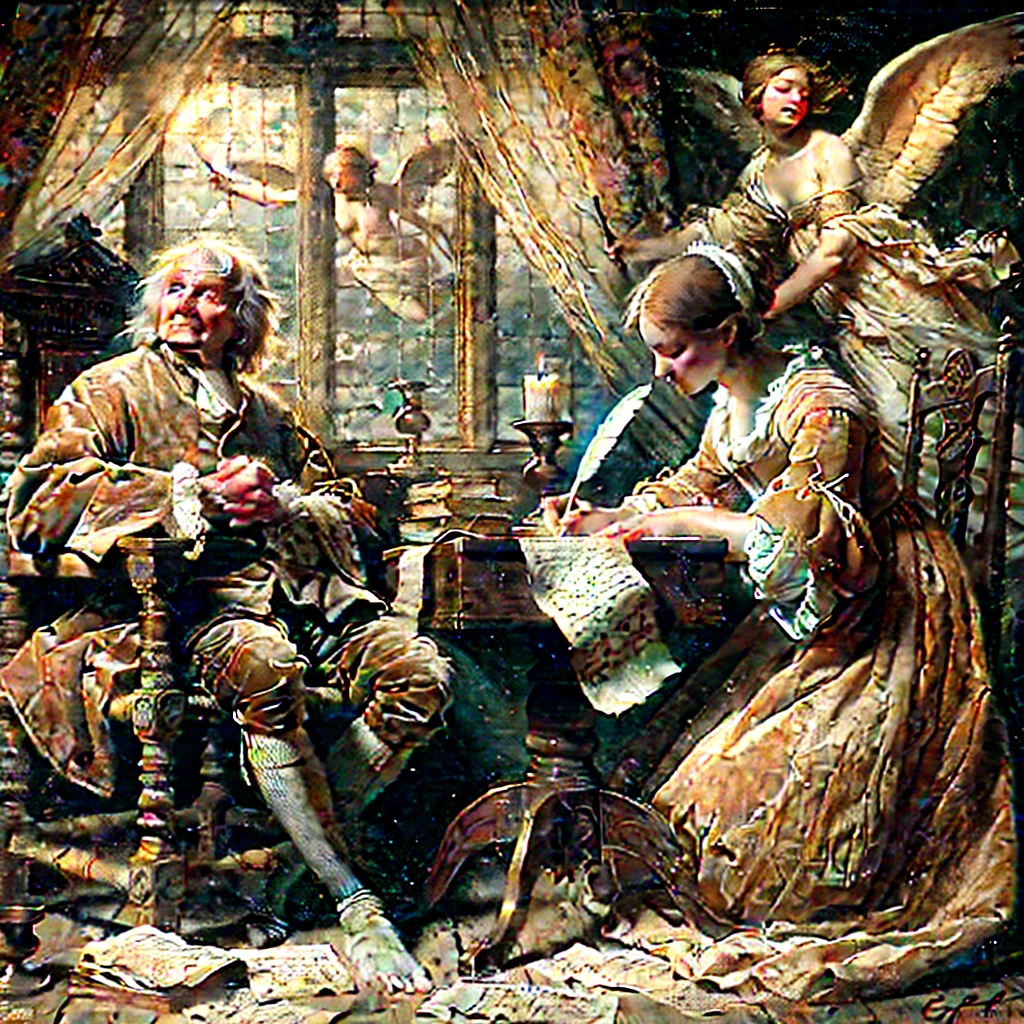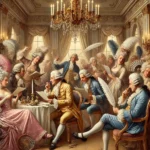By ABS, The Literary Scholar
A.K.A. The One Who Believes Milton Probably Dreamed in Iambic Pentameter
Meet the Man Who Out-Read His Eyeballs
John Milton wasn’t born a poet—he was born a walking encyclopedia with insomnia.
Imagine a student who:
Read every book in sight (in Latin, Greek, Italian, Hebrew, probably Martian)
Wrote essays for fun
And hit existential crises before his 23rd birthday
“How soon hath Time, the subtle thief of youth…”
Translation: I’m 23 and haven’t conquered the literary universe yet. What am I even doing with my life?
Yes, this is from his sonnet on turning 23. Meanwhile, most of us were just discovering caffeine and crisis.
Milton wasn’t playing.
He believed in divine purpose, poetic discipline, and grinding so hard he literally went blind.
The Scholar Goes Dark—Literally
All that reading, studying, tutoring, and pamphleteering (he wrote political pamphlets like they were morning workouts)… cost him his sight.
“When I consider how my light is spent…”
— Milton, post-blindness, casually rewriting human suffering in iambic genius
He didn’t complain.
He dictated.
He made his daughters read Latin aloud to him (they were not thrilled).
And he still produced work that would make most sighted writers cry into their keyboards.
Paradise Lost – A Poem So Epic, Even Satan Got a Character Arc
Let’s talk Paradise Lost, Milton’s magnum opus.
Written in blank verse (because rhyme was for amateurs)
Spread across 12 books
Featuring God, Satan, Adam, Eve, angels, demons, and one big mistake involving an apple
And here’s the twist:
Satan is the most interesting character.
“Better to reign in Hell than serve in Heaven.”
— Satan, probably in eyeliner, being iconic
Milton claimed he was trying to “justify the ways of God to man,”
But he ended up writing the most charismatic anti-hero in literary history.
People still debate whether Milton was secretly rooting for Satan.
Honestly, if Netflix adapted it, Satan would get his own spin-off.
Paradise Regained – The Sequel Nobody Asked For (But He Wrote It Anyway)
Milton pulled a theological sequel move and wrote Paradise Regained—a leaner, four-book poem.
Plot:
Jesus goes into the desert
Fasted for 40 days
Outsassed Satan
Paradise = emotionally reclaimed
It’s more subdued, less dramatic than Paradise Lost.
Think of it as the quiet indie film that followed a blockbuster cosmic battle.
Still powerful. Just less fire and more fasting.
Comus – The Anti-Netflix-and-Chill Allegory
Before all this epic theology, Milton wrote a masque (a kind of fancy play) called Comus.
What’s it about?
A lady lost in the woods
A seductive villain named Comus (basically a wine god with bad intentions)
Her purity and intellect protect her (with some magical help)
Subtext: Chastity is power, and woodland creeps should not be entertained.
It’s like a mythical TED Talk on virtue, disguised as a lyrical performance.
Samson Agonistes – Poetry Goes Full Greek Tragedy
Milton also wrote Samson Agonistes, inspired by Greek tragedy and biblical muscle.
Samson:
Lost his strength
Lost his sight
Lost his hair (tragic trifecta)
But in the end… crushed a temple and took out thousands
It’s a powerful metaphor for Milton himself:
Blind
Bruised
But still bringing the house down with language
Lycidas – The Most Elegant Mourning Ever Penned
When Milton’s friend drowned, he didn’t send flowers.
He wrote Lycidas—an elegy so rich, so lyrical, so overloaded with classical references, that it basically said:
“I’m heartbroken, and also fluent in 8 languages. Here’s your immortal tribute.”
It’s grief.
It’s beauty.
It’s also slightly intimidating, but that’s peak Milton.
The Sonnets – Small but Sharp
Milton’s sonnets were not casual love poems.
They were intellectual grenades, often aimed at:
Personal reflection (see: turning 23)
Political injustice (see: mass beheadings)
Religious hypocrisy (see: Milton picking fights with Rome)
He also wrote one to Cromwell—yes, that Cromwell—because Milton didn’t just write poetry, he wrote history in verse.
Milton vs. The Monarchy: The Pamphleteer Who Roared
If you thought Milton only dealt with angels and epics—think again.
The man had opinions, and he printed them faster than a Puritan could say “blasphemy.”
Enter: Areopagitica (1644)
A pamphlet with a name that sounds like a sneeze, but packed enough punch to shake the kingdom.
“Give me the liberty to know, to utter, and to argue freely according to conscience, above all liberties.”
Translation: Don’t you dare tell me what I can or cannot print.
Why did he write it?
Because Parliament tried to bring back pre-publication censorship, and Milton—blind or not—saw red.
So he delivered a fiery essay defending freedom of the press before the term was even invented.
Imagine a Twitter thread in 1644, but in beautifully crafted prose with footnotes in Latin.
His Royal (and Revolutionary) Drama
But Milton wasn’t done.
He dove headfirst into the civil war chaos with the literary equivalent of flaming arrows.
He:
Wrote pamphlets attacking Charles I
Defended regicide (a bold move, John)
Became Secretary for Foreign Tongues under Oliver Cromwell—basically the poetic PR guy for the new republic
For a while, Milton was the official voice of the English Commonwealth, responding to critics, writing diplomatic prose, and casually helping build a new order.
But then came Charles II.
The Restoration.
And suddenly, supporting the guys who beheaded your king became… socially awkward.
The Hiding Years (a.k.a. Paradise Lost: The Bunker Draft)
With the monarchy restored and heads being counted, Milton went into hiding—literally.
He was:
Blind
Broke
On the wrong side of history
But still, miraculously, not beheaded
And what did he do in exile?
He wrote Paradise Lost.
Twelve books of cosmic poetry while dodging political fallout.
The man didn’t just fall from grace—he wrote the entire fall of humanity while the government was looking for his head.
Language So Rich, It Should Come with a Glossary
Reading Milton is like:
Eating dark chocolate while being slapped with Latin
Swimming in metaphors
And occasionally pausing to say, “Wait, did he just describe the cosmos in one sentence?”
His syntax is complex.
His references are deep.
But his power is undeniable.
He made the entire English language flex.
The Man Behind the Scroll
John Milton:
Was a political firebrand
A theological philosopher
A poetic machine
A family man (but not the happiest home life)
And a literary icon who wrote through loss, pain, war, and blindness
He wasn’t funny. But writing about him can be.
He took poetry to the heavens, the abyss, the garden, and the ruins—and still managed to keep the verse clean and the grammar divine.
Ink replaced ashes. Thought replaced fear. And in the quiet after a hundred years of darkness, the world remembered how to dream again.
ABS gently folds the parchment, as if sealing a prophecy. Behind him, the echo of blind dictation still stirs the air—verses rising from the silence, as Milton once did.
When the world turned away, he turned inward—and from darkness, he wrote eternity.
Signed,
ABS, The Literary Scholar
By ABS, The Literary Scholar
A.K.A. The One Who Survived the 18th Century’s Intellectual Sword Fights (With Style)
Share this post / Spread the witty word / Let the echo wander / Bookmark the brilliance


